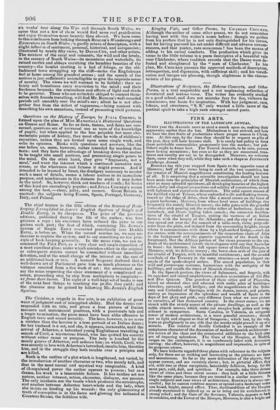The Cicisbeo, a tragedy in five acts, is an exhibition
of great want of judgment and of misapplied ability. Had the drama cor- responded with its title, and given a true picture of Italian
manners and matrimonial practices, with a passionate tale and a tragic termination, the piece must have been alike offensive to English taste and sound morality. The hero, however, is no more
a cicisbeo than the heroine is a true portrait of an Italian dame ; for her husband is a sot, and she, it appears, inexorable, until the arrival of Atherton, a betrothed young Englishman travelling in search of Cecil, a mysterious friend, who has quitted his country without either cause or purpose. The lady is touched by the
manly graces of Atherton, and seduces him; on which, Cecil, who was secretly in love with Atherton's betrothed, insults him, throttles him, and in the struggle they both tumble over a pricipice and are killed.
Such is the outline of a plot which is lengthened, not varied, by the introduction of another character or two, who merely talk, and
that in the most unreal and mystical way imaginable. A kind
of ill-regulated power the author appears to possess ; but as a drama, his work is a lamentable failure. It has neither art nor nature, neither interest, action, character, dialogue, nor passion.
The only incidents are the tussle which produces the catastrophe, and another between Atherton heart-whole and the lady, when she insists on binding up his wounds : the only glimmering of truth of conception is in the fierce and glowing tire indicated in Countess Strorni, the faithless wife.
Kingley Vale, and Other Poems, by CHARLES CROCKER. Although the author of some other poems, we do not remember having met with this writer's name before ; though we gather from his preface that he is not only distinguished for his verses, but for having pursued his art under difficult and adverse circum- stances, and that poetry, rare occurrence ! has been the means of adding to his carnal comforts. The production which gives its name to the little volume is a poem descriptive of a beautiful vale near Chichester, where tradition records that the Danes were de- feated and slaughtered by the " men of Chichester." In big plan, Mr. CROCKER pursues the approved methods of description, retrospection, and digression, with sufficient skill ; and his versifi- cation and images are pleasing, though slightness is the charac- teristic of his poem.


























 Previous page
Previous page